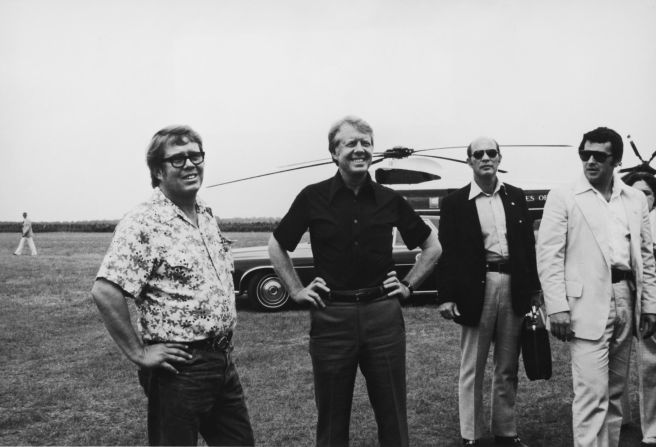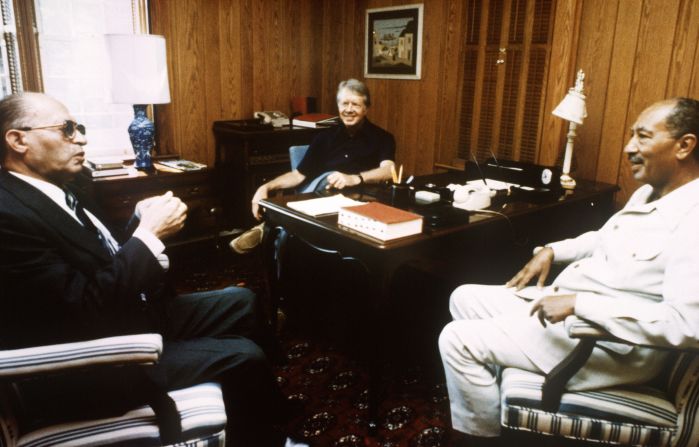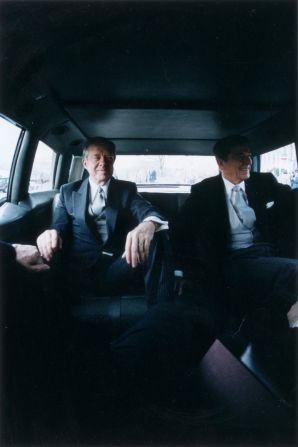Story highlights
Gerald Ford's decision to pardon Richard Nixon was unpopular at the time
In the mid-1970s, unemployment and inflation rose amid a recession
High fuel prices, the Three Mile Island nuclear accident and the Iran hostage crisis added to the nation's "malaise"
In his inaugural address on August 9, 1974, President Gerald Ford assured the nation “our long national nightmare is over.”
He may have spoken too soon.
While Ford was right that the Watergate scandal had run its course and the threat of a constitutional crisis had passed, many Americans had fallen on hard times.
Ford acknowledged this in his first State of the Union address. On January 15, 1975, more than a year into a crippling recession, he said, “the state of the union is not good.” For many Americans, it would stay that way well into the 1980s.
Here’s a look back at a few of the crises that defined the second half of the decade and the flawed attempts by two presidents to turn the country around.
Ford pardons Nixon
In the first few weeks after Ford took office, his stated priority was to heal the nation from the nightmare of Watergate. But his quick decision to pardon former President Richard Nixon for his involvement in the scandal was condemned by many.
A trial would have taken months or years and challenged the government’s credibility at home and abroad, the President said in Time magazine’s article “The Pardon That Brought No Peace” from September 16, 1974. But his decision further divided the nation:
But no sooner had Ford made his broadcast remarks than the nation – which had been caught totally by surprise – was plunged anew into deep and divisive debate. … Supporters agreed with Ford that his predecessor had indeed “suffered enough.” Critics, including many legal experts, charged that Ford had established a dual system of justice, that he had put Richard Nixon above the law. … By taking such sweeping action so soon, Ford damaged his efforts to restore confidence in the U.S. presidency and opened his own credibility gap.
Falling wages, rising prices
After the Arab oil embargo began in 1973, the country fell into a recession, and ordinary Americans paid the price. Millions were out of work, inflation was soaring and the unemployment rate was on the rise.
Time’s article “The Recession: Gloomy Holidays – and Worse Ahead” from December 9, 1974, described the state of the nation:
Not for many years has a Christmas season begun with so many tidings of spreading discomfort and lack of joy about the U.S. economy. Already racked by a devastating double-digit inflation, the nation is now also plunging deeper into a recession that seems sure to be the longest and could be the most severe since World War II. Consumers who a few weeks ago worried mostly about rising prices now fear for their jobs and incomes as well. For many Americans, the Yuletide will be a time of less elaborate meals, infrequent parties, fewer and cheaper presents.
Reagan challenges from the right
As the country trudged through the recession, many Americans were still skeptical of the politics in Washington. This mistrust set the stage for Ronald Reagan, a Hollywood actor and two-time governor of California, to forge a formidable campaign against Ford for the Republican nomination.
Time’s article “Republicans: The Star Shakes up the Party” from November 24, 1975, read:
In another election year, an insurgent’s challenge to his party’s incumbent President would be politically suicidal, or at best quixotic. But 1976 will be anything but a typical political year. Disturbed by inflation, unemployment, crime and the sprawl of Big Government, Americans seem to be growing more conservative. … Reagan, who, despite his years in the public eye as a Hollywood actor and California Governor, is viewed as a fresh face in presidential politics because he cannot be identified with the problems in Washington.
Ford won the nomination, but Reagan stole the hearts of conservatives. In the general election, voters took a chance on a “man of the people,” electing Jimmy Carter, a former peanut farmer and Georgia governor, as President. But Carter had his work cut out for him.
Energy crisis and nuclear disaster
By 1979, U.S. dependence on foreign oil had increased nearly 50% since the 1973-74 Arab oil embargo, according to Time’s article “Inside the Big Oil Game” from May 7, 1979. The embargo led to fuel shortages and sky-high prices throughout much of the decade. At times, Americans were waiting in line for hours to fill their gas tanks.
Just as Carter was about to propose a new approach to the nation’s energy crisis, the country experienced its biggest nuclear disaster, at a plant in Pennsylvania.
A partial meltdown of the plant’s reactor core led to the release of radioactive gases into the atmosphere. Although the health effects were apparently minimal, the accident raised public fears and delivered a devastating blow to the nuclear power industry.
Time’s article “Three Mile Island: Nuclear Nightmare” from April 9, 1979, read:
For the next several days, radioactive steam and gas seeped sporadically into the atmosphere from the plant. Pennsylvania Governor Richard Thornburgh advised the evacuation of all pregnant women and preschool children living within five miles of Three Mile Island, and thousands of people fled the area. As tension mounted, engineers struggled to cool the reactor’s core. There was a genuine danger of a “meltdown.”… At week’s end officials insisted that while the danger of a meltdown had not vanished, it was receding. … But the already beleaguered nuclear power industry had clearly suffered a crippling setback.
Crisis of confidence
That summer, the national mood had shifted to one of “malaise,” a word that has come to be associated with the Carter presidency. Time’s article “Carter at the Crossroads” from July 23, 1979, highlighted Americans’ concerns:
“There has been a lost sense of trust,” (Carter) told aides, “a loss of confidence in the future.” Part of that concern, he inevitably learned, involved the President himself. For some time past, but more sharply this summer, the U.S. has been slipping into a morass of interrelated problems. One is the energy crisis, marked by its gas lines and soaring prices. One is the painful combination of inflation and economic stagnation. One is the widespread perception that Jimmy Carter has seemed unable to make a strong attack on either of the first two.
Carter had reached a turning point in his presidency, and so had the country. The Iran hostage crisis that began in November of 1979 and lasted for 444 days would be the President’s undoing.
Visit Time magazine’s vault for more of its coverage from the era.








































































































































